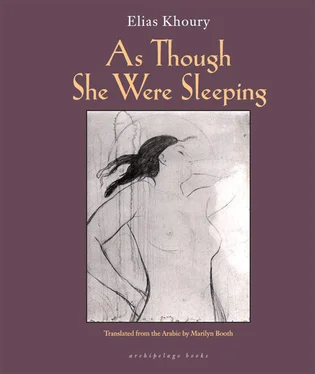No. The nun did not tell the truth. Her dreams were not the work of the Devil. How did the nun learn of her dreams, anyway? Saadeh was to blame. Since their father’s death Saadeh had become virtually a ring on the nun’s finger, there to be twisted and played with exactly as she wanted. All of the family’s tales were transmitted to the nun through the ear canal of confession: and in itself, this was an extraordinary tale with no precedent.
The sainted Milana did not stop at exercising control over the nuns of the Convent of the Archangel Mikhail. Her influence extended to the very priest, Father Boulos Saba, whose decision it had been to let her hear confession. The two had agreed that she would receive confession from the women and then would send the penitents to Father Boulos to receive his blessed forgiveness. The priest himself made penance to the nun, in an utter reversal of all the faith’s traditions. But the nun’s astounding powers and her ability to cure the ill allowed her to exceed the limits in every possible way.
Through the confessional all the stories and secrets of the Shahin clan became Haajja Milana’s property. And because of it, no longer could Milia endure the nun’s looks with their blend of pity and withering scorn. She realized that the stories she had lived with Najib and Wadiie were known to the nun in all their detail, that her secret lay bare alongside thousands of others filling the holy woman’s sainted head.
The mother grew quiet and her body began to perspire as the oil spread across her nightgown.
Once I have gone, said Sister Milana to Milia, rub her body with spirtu alcohol. The spell is over and she is fine now.
The nun turned to go out but paused at the door and her reedy voice called out to Milia.
Naam? responded Milia politely.
The nun put her hand on the young woman’s shoulder, leaned over her ear, and whispered. The nun told her not to be afraid. The bridegroom will appear, she said. And I see traveling. But you must settle yourself down first. You must pray that God saves you from the worst. Forget Najib, and the second one too, what was his name? The real bridegroom will come, and he’ll come soon, don’t worry. But what is most important is that you stop this business of dreaming. A believer, my dear, does not dream. Or if he does, he does not remember. Or if by chance he remembers, he does not talk about it. Night is the journey of darkness. It is our practice for death. Only the prophets and the saints see things at night. Ordinary people are submerged in darkness when they sleep, and nothing interrupts it. All praise be to the Almighty who created sleep so that people could prepare themselves for death. The world of night and the world of day do not come together. God is light and the Devil is darkness. My girl, you must forget your dreams and then I am certain that Almighty God will open the gates to your countenance.
But I –
She did not let Milia complete her sentence. She coughed loudly and said that dreams are the Devil’s means to land human beings in sin. And anyway, she said, you’re a liar. Nobody can remember all their dreams. Every day, every morning, you make your mother tremble with fear listening to you. Every day and the next, hearing your dreams, and that’s why she is always coming to the convent. Haraam , what has your mother done to deserve this? It’s your brother Salim who’s to blame, who got that Najib going. . Enough, Milia! You are like my own daughter. I pulled you out of your mama’s belly and I held you high to bring you nearer to God. Enough, now — stop this foolishness of yours!
The nun went out without waiting for any response from Milia. The girl wanted to say that it wasn’t true. That she didn’t tell her dreams to her mother every day, and that her dreams belonged to her, and that they were not the Devil’s whisperings. If they were, how could their predictions always come true? She had told her mother the dream about Najib because she had truly felt humiliated and upset at the time and then afterward she wanted to let on that now the whole affair was a matter of indifference to her. Sister Milana having gone, Milia stood there feeling she had been stripped naked by the nun’s words. Suddenly she had discovered that her stories were no longer her own to possess. Her mother had given everything to the nun.
It was nighttime. Trees leaned against other trees in a darkness of their own making, and like whips the rain lashed the rooftops. Milia opened her eyes and wiped the dream from her eyelashes to find herself in water. The ceiling in the liwan was leaking and a shiver of cold ran along her arms. But instead of rising from bed to take up the rug and set pots beneath the holes in the ceiling, she closed her eyes again. After all, she did not believe her eyes. The dream returned just as it had appeared to her a few moments before. She saw herself, a little brown-skinned girl sitting on the rocky edge of a deep wadi, at her back a white churchlike building. She was alone and she didn’t know where she was. She listened to the rustlings coming out of the wadi and to the sounds made by the wild grasses. From there a woman came toward her, hair concealed beneath a long blue wrap, body encased in a long blue gown.
The blue woman came out of nowhere carrying a suckling babe wrapped in a shroud of white swaddling clothes. She set the child down in Milia’s arms and disappeared. Milia is alone, holding a tiny dark-skinned boy child who breathes deeply and soundly. The baby’s breath sighs against her neck. She lifts it to hug it close to her chest. She sees large round eyes that seem to take up the whole of his baby face. She watches herself enter the shadows of those pupils and finds herself in a space of vast depth and colossal height. The child stares at her and takes her inside his eyes where water surrounds and embraces her. She tries to come away from the watery lakes of those eyes. She puts her hands out defensively, certain that she is drowning. She opens her eyes, sees the rain dripping from the ceiling and senses the chill along her arms. She closes her eyes and sinks into the eyes of the dark-skinned boy child. Never has Milia seen eyes like these: the whites so large, black pupils floating at their centers, each eye a black mirror inside of a white mirror. The child takes her to his eyes and the little girl is not strong enough to resist the pull of his pearl-drop tears, ringing the enormous black pupils.
Rousing herself at the sound of her mother crying at her to set pans beneath the holes in the ceiling — And hurry! her mother was shouting — Milia shivered uncontrollably with the sensations her dream had piqued. Cold sweat covered her breasts and thighs and desire swept over her like a terrible storm. It was a longing for which she could locate no equivalent; she had never felt the likes of its force. It bore no resemblance to the desire she had felt for Najib or for that other man called Wadiie, or for the doctor who had treated her broken leg. The three men were simply relics of her tongue and nose and memory. They were the love of storytelling, the love of fragrances, or the deliciousness of love postponed. But this was the desire of the heart.
Three times on a rainy night she saw him. She understood that she must go to him.
The story of the Armenian doctor exhausted that phase of utter exhaustion, her adolescence. A girl of sixteen breaks her right leg after falling from the swing suspended from the fig tree and finds herself in the hands of two Armenian doctors in Bourj Hammoud. Actually, Zaven Hovnanian and his brother Harout were not physicians but “bonesetters” — a mujabbir arabi , as were called practitioners of folk medicine learned from their family elders or inherited through blood. Rather than setting broken bones, though, they simply applied a sort of spiritual massage therapy. In a darkened house of closely shut windows and drawn curtains, Milia smelled a strange odor and did not understand the shadowy sensations that infused her.
Читать дальше












